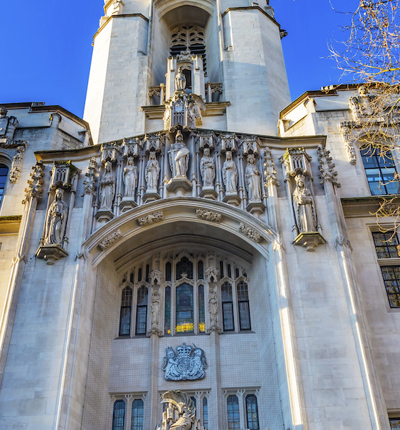
Supreme Court rules on secret hearings in public law hearings concerning 'criminal cause or matter'.
The highest court in the UK, the Supreme Court, has ruled today that secret hearings have no place in public law proceedings concerning a “criminal cause or matter”.
Posted on 04 July 2018
The appeal heard by the Supreme Court in March 2018 concerned Mr Belhaj and his wife Mrs Fatima Boudchar. In May this year the Government unreservedly apologized to the couple, who in 2004, were unlawfully rendered to Libya.
The Attorney General, on behalf of the Prime Minister apologized for their ‘harrowing experiences’ and acknowledged that the UK Government had ‘sought information about and from [Mr Belhaj]’ during the time he was imprisoned and tortured by the Gaddafi regime.
In 2012 the Metropolitan Police conducted an investigation into possible criminal offences committed by UK officials in relation to the rendition.
They submitted 28,000 pages of evidence to the Crown Prosecution Service (CPS). However, in 2016 the Director of Public Prosecutions (the DPP) Alison Saunders said it was “impossible to reconcile conflicting evidence about what happened at the time” and that no charges would therefore be brought.
Lawyers from Leigh Day, on behalf of Mr Belhaj and his wife, sought to challenge that decision by way of a judicial review.
Lawyers for the UK authorities argued that a Closed Material Procedure (CMP) should be allowed as part of the proceedings.
At the Supreme Court hearing in March 2018 lawyers for Mr Belhaj argued strongly that their clients’ case concerned ‘a criminal cause or matter’ and as such secret hearings were not allowed under the Justice and Security Act.
In today’s judgment by the Supreme Court, following that hearing, Lord Sumption agreed, stating: “In my opinion, the Appellants are entitled to succeed on this appeal because in its ordinary and natural meaning “proceedings in a criminal cause or matter” include proceedings by way of judicial review of a decision made in a criminal cause, and nothing in the context or purpose of the legislation suggests a different meaning.” [Para 16]
Rosa Curling from the human rights team at Leigh Day who represented Mr Belhaj and Ms Boudchar, said:
“Although our clients’ claim against the DPP is not proceeding, they are delighted the Supreme Court has upheld their belief in the UK justice system: one which is fair, open and transparent. To have allowed secret hearings in cases like theirs, which relate to criminal causes or matters, would have closed off open justice to many victims of crimes. The judgment today is an important safeguard against the government’s attempt to extend secret hearings into yet further types of proceedings; and allow the Justice and Security Act to apply in areas not envisaged by Parliament.”
Mr Belhaj said: “I am delighted the Supreme Court has upheld the key principle of open justice today. I have achieved justice in my case. I hope this judgment will allow others to do the same.”

